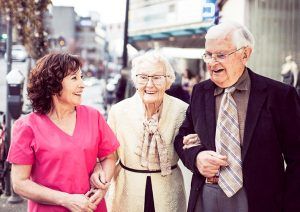Love, Relationships, and Home Care
Why Your Home Care Plan Must Be Built Around Meaningful Relationships

“Love is the most powerful of human bonds, not easily broken or forgotten. We continue to love those who have passed long after they are gone, and memories of first loves remain well into old age. To love, and t0 age, is a privilege, and the ability to love and find love is bound by the constraints of neither age nor time.”
Ari Seth Cohen
As we celebrate Valentines Day there couldn’t be a better time to talk about the importance of love and its relationship to home care. There’s no denying it, healthy romantic relationships are most definitely good for the heart. But science confirms that healthy relationships in any form, from spouses to trusted associates, are the key to happiness and to living a healthier, longer, more fulfilling life.
For most of us, we spend a good part of our “younger” and mid-life planning for older age. In particular, we focus on financial security and our physical well being, thinking about our living and “care” arrangements framed in the context of how or if we will be able to physically and financially take care of ourselves. Will we need care in the home to help us prepare meals? Will we need home care to help with bathing, shopping, driving? Will we be able to afford home care? Can we access a home care package to help fund our care plan?
All important questions and certainly an important part of any home care plan, but what of our core happiness? Happier ageing doesn’t spring from having enough money or being able to bath comfortably. It is a result of being surrounded by the people and purpose that makes each of us individually happy. According to George Vaillant, a Harvard psychiatrist who directed a 75-year study into happiness, the overwhelming result of the study was that happiness is built around two ‘pillars’: Firstly, love and secondly finding ways to ensure we don’t chase love away.
The overriding finding which George Vaillant and his team put so simply: “good relationships are what keep us happier and healthier.
At Nurse Next Door we believe that the best home care plan is one that is built around relationships. Our caregivers are not simply qualified in their field, they’re trained in our philosophy of Happier Ageing which is built on the science of positive psychology and, not coincidentally, supports the three key findings of Vaillant’s 75-year happiness study:
Social connections with family, friends and community result in longer happier lives.
OK, this isn’t new news. But that makes it even more puzzling as to why relationships aren’t a major factor in our home care decisions. Often times we hear loved ones talk of the hope that placing an elderly relative in an aged care home will ensure they’re not lonely. The happiness study confirmed that in fact people are still lonely in a large group, and conversely can experience great happiness alone if they are secure in the knowledge that they have excellent relationships with people they can count on.
When considering options for home care why aren’t we considering the option that maintains our connections with the community, our friendships and relationships? Why aren’t we placing the utmost importance on ageing in our own community, staying in touch with our social networks, surrounded by the connections we have spent years creating, nurturing, developing.
At Nurse Next Door, when providing home care, we focus on social connections, community engagement and building relationships. For some it may be as simple as a perfectly matched caregiver who becomes a close friend, for others, there may be trips to community group activities, time spent online connecting with overseas friends and family via social media networks and for those with adventure in their bones, a trip overseas with a caregiver to provide companionship and assistance whilst travelling.
Whatever is required, the caregivers at Nurse Next Door are trained to understand that maintaining connections does not happen without planning and effort. This was confirmed in the 75-year study which found that those who were happiest, were those that had actively worked to maintain or, where necessary, replace relationships such as work colleagues after retirement.

The quality of our relationships is what drives the benefits
Connecting with the community is important however it’s not as simple as being surrounded by lots of ‘friends’’. Unless relationships are meaningful they won’t result in happiness and in fact, run the risk of increasing loneliness. As we age studies have shown that although our social network may decrease, this is often replaced with the fact that we have more time to spend socialising with friends and neighbours. Now imagine being removed from the very relationships we have spent years, possibly decades cultivating. Not just a marital partner but deep friendships from a variety of places – our children’s school community, sporting clubs we have been associated with and neighbours who have been there throughout our lives.
In a study conducted by Kate Burke older couples listed Honesty, Communication, Companionship, Respect and Positive Attitude as being necessary for relationship success. Furthermore, research has suggested that self-acceptance increases with age and that with age, people have a stronger sense of their true self and less of a discrepancy between ‘real’ and ‘ideal’ selves. We also know that our identities are often heavily connected with our home and the community we live in.

Good relationships protect our brains
If the first two reasons aren’t compelling enough, the happiness study clearly showed that people in their 80’s, who have securely attached relationships, with people they know they can count on, have memories that stay sharper, longer!
Matthew Lieberman, a distinguished social psychologist and neuroscientist, put it best: “Man is by nature a social animal”. Our brains are wired to form and belong in relationships and default to what Lieberman refers to as “social thinking” in our downtime. Anthropologists confirm this noting that most animals have a brain relative to their size – the elephant a large brain, the mouse a small one. Yet humans have a large brain compared to our bodies which has been shown to result from our primary need to socialise.
The AARP’s Global Council on Brain Health presented data that showed having strong ties to friends and family and participating in meaningful social activities can positively affect brain function, making social connectedness a public health issue. Just exactly how social connectedness impacts the brain is still being researched however it is theorised that meaningful interactions with others help protect the brain from the harmful impact of stress, due to the happiness experienced when surrounded by meaningful relationships. Other studies have found more concrete evidence of cognitive benefits, showing that engaging meaningfully in our community can reverse the decline in our brain volume.
Home care that doesn’t consider, and more importantly seek to maintain a person’s relationships and their engagement in their own communities leaves them at risk of anxiety and stress. A study published in November 2018 found that one in four Australians report being lonely with higher levels of social anxiety and depression and poorer psychological health. Not because they are physically alone but due to loneliness stemming from a lack of meaningful relationships.
It may sound cynical or counter-intuitive to “plan” for love, but planning ahead to ensure connections and relationships with loved ones are maintained as we age is a sure way to know you’ll be surrounded by love well into older age.
Ari Seth Cohen photographer and author of “Advanced Love” has produced a short film capturing the beautiful relationship shared between Mort and Ginny Linder.
Learn more about how Nurse Next Door can support you to live your best life, in your own home, on your own terms.
Check out our home care services or give us a call at 1300 600 247!
